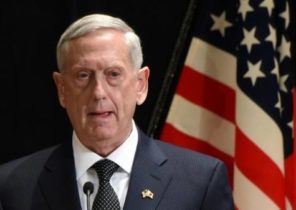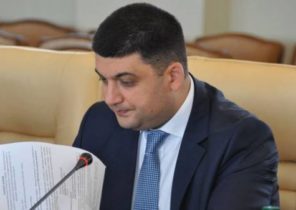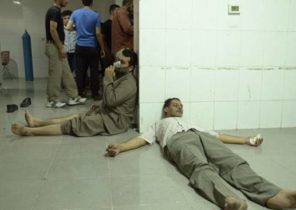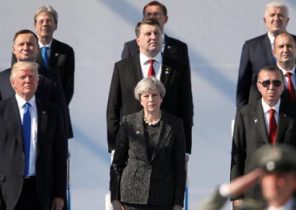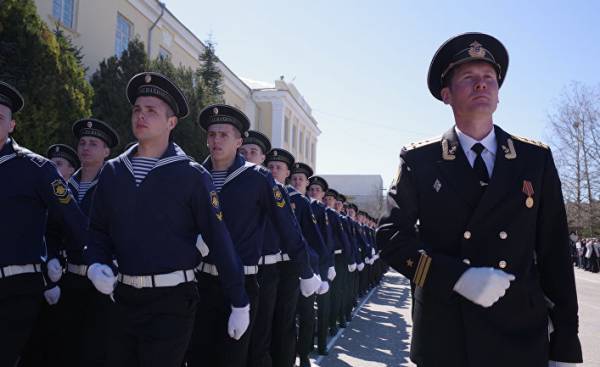
In a provocative column in the Financial Times of March 27, under the heading “Brakcet and Imperial amnesia” (Brexit and Imperial Amnesia) Gideon Rachman (Gideon Rachman) rebuked the British for, in the words of one reader, “a serious misunderstanding despotic, Imperial past of Britain”. The article Rahman gave rise to lively and very exciting debates on the subject, and has given me a deeper understanding of the more remarkable article, I had recently read in “the Independent newspaper” for 17 March. This article is called “the Main thing is not to repeat the mistakes,” and wrote Deputy Director of the Moscow Institute of political and military analysis Alexander Khramchikhin.
The mistakes referred to in article hramchihin considers egregious blunders committed by Russia (and Soviet Union) at the expense of myself. Interestingly, he does not include in this list of failures of such tragic episodes as the deportation of Circassians, the suppression of Polish independence, Stalin’s atrocities, or the defeat of the revolution in Hungary in 1956. No, unfortunate historical errors of Russia caused by its excessive generosity and failure to appear are as a result opportunities. Here are examples of reckless Russian restraint:
• During the Seven years ‘ war, the Russian army in 1758 had occupied East Prussia and had all the chances to beat the Prussia of Frederick the Great from the ranks of the leading European powers. But in the beginning of 1762 for the Russian throne, the admirer of Frederick Peter III, who admired his idol and led Russia out of the composition antirusskoe coalition, and also gone from East Prussia. The expert regrets that Russia has missed an opportunity to prevent the unification of the German lands and to prevent the First world war. But if the war is still started in one form or another, then the former East Prussia would be in the position of the Russian provinces, and from there to the Russian army immediately opened to direct and shortest route to Berlin.
• If you believe Hramchihina, the Russian show of force in 1833, has saved the Turkish Sultan Mahmud II from his rebellious vassal of the Egyptian Pasha Muhammad Ali. Instead, to spare his old enemy-Osman, says Khramchikhin, Russia had to take advantage of the weakness of the Turks and pick up all the European possessions of Turkey and a considerable part of Anatolia, “leaving the rest of the Egyptians.”
• Similarly, in 1848 Russia had saved the Austrian Empire, suppressing the Hungarian uprising. Russia could use this opportunity to connect inhabited by Ukrainians of the Austrian territory of Galicia and Bukovina (“who then was not Russophobic, as it is now, and quite Pro-Russian”), or could demand them as payment for services rendered Vienna.
• When the Communists in the late 1940s, seized power in China, Stalin gave them short-sighted nominally Chinese, but in fact were under the power of the Xinjiang province, although it is 40 years “is asking at least to independence, as a maximum — in the USSR.” Even more unfortunate, Khramchikhin believes that Stalin abandoned the “Korean version” and divided the mainland into two approximately equal halves between “red” and “white”. So it would create a constant confrontation between the two parts of China, excluding the possibility of “any external expansion”.
In a recent article, Andrei Kolesnikov of Moscow Carnegie center commented on the mentality of Russians, convinced that the “glacial periods in Russia’s history — periods when cold-blooded leaders ruled with an iron hand — for the country was good. The thaw — periods of democratization and modernization was bad, it was characterized by disruption and violence.” Khramchikhin in his article foreign policy offers confirmation of this rule: territorial expansion of the Russian state always and everywhere was good, and the rejection of the extension, worthy only of regret.
It is always interesting to listen to the Russian, whose country is the largest in the world at least since the conquest of Siberia in the 16th century. They complain about the quirks of history (not to mention the spiteful intrigues of enemies), deprived the Russian government of large areas. Unlike Russian, it is difficult to imagine modern English analyst who complains that the British Empire had not created more colonies (e.g., Tibet, Afghanistan, or a piece of Persia). Or Americans who mourn what America has not included in its membership, the UK and Canada took large areas of Mexico, where there in the beginning of the 20th century there was a civil war. Imagine the international reaction if some German analyst took to mourn the failure of his country to implement the Brest-Litovsk Treaty of 1918, stating that he could provide long-term security of the Eastern borders of Germany, would prevent the emergence of a strong Soviet state and preventing the outbreak of the Second world war. And further by analogy: if the war is still started in one form or another, the Baltic States, Belarus and Ukraine at that time would have been dependent territories of Germany, and German troops would open direct and shortest route to Moscow.
But enough of fantasies in which he would blush to Rudyard Kipling. In the end, the former Imperial power should be ashamed of their gains, and not to grieve because of the fact that their territorial gains were not as extensive.
Khramchikhin trying to embellish an important question about public opinion in areas that could (no, should have been) to be part of Russia. Yes, the Ukrainians of Galicia and Bukovina in 1848, could not agree on a Russian Board, at least at the initial stage; but I find it hard to believe that the Germans of East Prussia enthusiastically welcomed the Russian army in 1758, and especially in 1914. Many Turks in the Balkans and Anatolia would be very difficult subjects for the king, because even the Balkan Christians were quite restless. In the 19th century they were revived and strengthened their own national state, and the Russian Empire would become for them an unpleasant nuisance — exactly the same as the Ottomans. I must admit that in the late 18th and early 19th century, when most Europeans East of the Rhine lived in multinational empires, or mini-States, the territory passed from hand to hand without regard for the wishes of the population living there. This practice in the 19th century began to create more and more problems in connection with the rise of nationalism, and then it became simply impossible. It is for this reason began to break up large empires. Curious to see how the Russian Empire managed to avoid this fate and to constantly expand their territory in spite of the dissatisfaction and grievances of those non-Russian nationals who were already in it.
The theme of the collapse of empires raises another important question. I hope I don’t go too deep into the analysis Khramchikhin, but it has some subtle and sinister implication. It would seem that there is no point to mourn the loss of a historic opportunity to join the new provinces to the Russian Empire, since these territories still were destined to gain independence in 1917, 1991 or any other year. In the illusory sorrow for the loss of territories that never belonged to Russia, there is a painful longing for the Empire, which did not. Therefore, essay Khramchikhin seems to me not so much an exercise in guesswork on the principle of “what if”, and a hidden reproach about the collapse of Moscow’s Empire and the subsequent decolonization of post-Soviet Russia’s periphery. In other words, a case of Imperial nostalgia.
Moreover, if you go this way and begin to regret the missed historical opportunities (which often can only be seen in retrospect), it is possible endlessly to build arguments against the containment of its Imperial appetites. Khramchikhin could complain about the fact that Russia is mediocre and, for unknown reasons, not have used their positions in Alaska in California in the 18th and 19th century, in order to stifle North American imperialism in the cradle, or at least to deprive the Americans (and their canadian lackeys) the possibility of access to the Pacific ocean. Or some inexplicable short-sightedness shown by the Tsar Alexander I, when he after the defeat of Napoleon brought the Russian army from the occupied and liberated Paris.
But there is a more pressing question about where today there are such weak points — where the short-sighted and inappropriate restraint, the nobility of Russia threaten its long-term interests. Where today Russia may repeat their mistakes?
Curiously, Khramchikhin says very little about Russia’s relations with the perfidious West because current approaches of the Kremlin there appears to be no particular threat of unnecessary sentimentality. Instead, he cautiously speaks of the “strategic partnership” of Russia and China, condemning Beijing for what he has not Moscow effective support in the Crimea, in Ukraine and in Syria, and calling on the Kremlin to follow the example of China more strongly defend its own national interests. It is for the reason that China became Russia’s new poldrugo-polovragi, Moscow should abandon its deplorable inclination to succumb to deception and trickery allies.
But in the post-Soviet space and especially Ukraine Khramchikhin sees the important need to pursue a tough policy without any flirting and politeness. He argues: “the Idea of an independent Ukraine is Russophobic by definition. That is, Russia and Ukraine are either one country, or enemies”. Khramchikhin condemned the Kremlin for what he is until 2014 “meekly funded Ukrainian Russophobia”. Only after the coup in Kiev in February 2014 under openly anti-Russian slogans to Moscow came down “a brief insight”, and she behaved with Ukraine as she deserved. But in this case, Russia has limited itself to half measures. “It is now clear that the Donbass had to do the same as with the Crimea”, — says Khramchikhin. He further makes the following conclusion. “We must treat her as a direct enemy, not the act of “brotherhood of peoples”. We in any case shall not make the Kiev regime that the present he desperately wants now to direct military invasion”. You just have to push in a timely manner swayed by the Ukrainian government, and then let the internal contradictions of the enemy will prevail. “Our goal, — says Khramchikhin concludes — should be the collapse of the current Ukrainian state and his regime to further their complete reformation, a political and territorial”.
Khramchikhin, like many Russians, probably comes from the fact that the Ukrainian hostility towards Russia (a Russian exaggerating, but nevertheless), completely unreasonable and ungrateful reaction is selfish, stubborn and backward peasant people (Ukrainians) to centuries of unwavering goodwill of Moscow. But the key to understanding the seemingly inexplicable behavior is not a defect of Ukrainian collective psychology, namely the Imperial amnesia of Russia. For example, Khramchikhin rightly observes that in the 19th century the Ukrainians of Galicia and Bukovina were deeply Pro-Russian, and now are very hostile towards Moscow. But I don’t think he has a clue about how and why there was such a change in the relationship. Perhaps he, like many Russians, he believes that the Ukrainians simply brainwashed anti-Russian propaganda. As for Galicia and Bukovina, honest analysis of the historical period after the inclusion of these territories into the Soviet Union in 1939, will answer all the mysteries about why the local population attitude to Moscow has changed dramatically.
Amnesia Imperial Russia finds a decent pair in complete ignorance of many Western analysts of the historical context of Russian-Ukrainian relations. They may view the conflict only through the distorting prism of great power rivalry or a well-worn ideas of the “Great game”. I was struck by one Western commentator, who, in his inept quest for impartiality said that there are plenty of historical examples of how Russian troops trampled their boots Ukraine. Here you should also add that there are plenty of historical examples of how American troops stomped their boots Caribbean Islands, or as the German army invaded Belgium. Moscow doesn’t deserve to her disgusting actions in Ukraine was due to some historical precedents. And no one should consider the Russian intervention against Ukraine and other “precedents” as a standard, and therefore understandable and excusable behavior.
Many Western analysts and Russian observers were confusing the idea that the Ukrainians are unable to appreciate their national identity and willingness to defend it. In fact, Ukrainians are delayed war for independence and the preservation of the state, which unexpectedly and peacefully went to them in 1991. The only surprise here is that someone Ukrainian patriotism may seem surprising.
Or Russia and Ukraine — one country, or they are enemies. This is a purely Russian, but not Ukrainian sentiment. It is Russian called Ukrainian statehood, and the very idea of the Ukrainian ethnos true and unjustified Russophobia. Ukrainians, for their part, until 2014, was very friendly to Russia and without any interest, and even hostile to NATO membership. Those analysts who claim that Russia intervened in Ukraine to prevent NATO expansion, put the cart before the horse. The goal of Russian policy is not to not to let NATO in Ukraine. It is the destruction of the Ukrainian state, which NATO would eventually accept. The goal is to “collapse of the present Ukrainian state and his regime to further their complete reformation, a political and territorial”. Not the threat of NATO expansion in the short term (such threats were not) caused understandable and immediate reaction from the Russia. Just opportunistic Russian invasion has strengthened many Ukrainians thought that NATO membership is a very attractive prospect. Moscow continually makes the same historical mistake, speaking as the chief recruiter to the ranks of the Alliance, but Khramchikhin, for some curious reason, doesn’t want to admit it, although this idea fits into the concept that Russia condones their own enemies.
Khramchikhin is a hypocrite, calling on Moscow “in no case do the Kiev regime that the present he desperately wants now to direct military invasion”. The current military actions of Russia in Ukraine are no less direct because they are limited and are carried out secretly. Moreover, the refusal of Russia to repeat the Crimean scenario in the Donbas is not due to a deficiency of determination and not attack traditional Russian benevolence. Just at the crucial moment of the “Russian spring” in 2014, Moscow did not have enough personnel who could quickly transfer to Ukraine. Crimea was a priority, and in the Donbass “polite green men” is not enough. Russia seeks to solve this problem by creating and restoring their military bases near the Ukrainian border. In the near future near Ukraine will be tens of thousands of “polite green men”, and they can become the driving force of “spontaneous popular uprisings” against the “fascist junta” in Kiev, which inspires Moscow.
Many Russians build the illusion that gentle fraternal nudge will be enough to overthrow the government in Kyiv to destroy Ukrainian state and end this obscene national project in Ukraine. But the fiasco of Moscow with the idea of new Russia in 2014 should make the Russians think. The Kremlin has come up with some mythical formation with its own flag under the name “Novorossiya”, believing that it will become a locomotive of mass separatist movement of the Russian-speaking Ukrainians. But the project failed miserably when the Russian speaking population of Ukraine with varying degrees of enthusiasm decided to stay in it. If, by analogy to judge the desire of the Irish to reunite with Britain, taking as a criterion the number of English people who walk the streets of Dublin, we are very much mistaken. Moscow made the same mistake with Novorossia, but even now it is not clear whether Russian from this the necessary conclusions. The flag of new Russia is still flying in the occupied Donbas, and this suggests that the project of new Russia, the Kremlin keeps in reserve to push it again when it’s an auspicious moment.
In the coming years from Russia, you can expect numerous and active attempts to overthrow the shaky, yet surprisingly tenacious Ukrainian state. From the point of view of the Kremlin, it would be a great folly to conclude an agreement with Ukraine now that she was barely standing when chronic corruption, irritable politics and fragile economy make Russia great optimism (another classic Russian error Hramchihina). Indeed, Ukraine has the amazing ability itself to cause injuries. But is it possible to encourage the Russian-speaking population of Ukraine, unhappy and irritated deplorable state of Affairs in their country, to abandon the Ukrainian statehood and to support the idea of new Russia? This is a tempting assumption, and it surely will inspire the Russian policy in the foreseeable future. However, Ukraine, despite their numerous and ongoing crises have succeeded, at least, that strengthened the national identity of its population. And of course, the Ukrainian army will never have such a weak enemy resistance, as it was in 2014. Russian can dream all you want, but Ukraine has become a tough nut to crack.
They say that chance knocks only once, and 2014 could be Russia’s last chance to destroy the Ukrainian national sovereignty. The conflict in the Donbas became a war of attrition, in which Russia is using watchful waiting, hoping that chance will come knocking on her door again. If Russia is unable to kill the Ukrainian national project, then maybe she will be able to cripple Ukraine, snatched from her fabulous new Russia? Maybe these rebellious and treacherous Ukrainians, known for their stubbornness and duplicity, contrived and outwit stronger and more numerous Russian? Most likely, many years will pass before we know about it.
Meanwhile, Americans ‘ faith in the Ukrainian Russophobia becomes a self-fulfilling prophecy. The war led to predictable consequences, and on change warm thoughts about the Russian-Ukrainian brotherhood and solidarity in the minds of Ukrainians have appeared more grim images from the General history: the persecution of the Ukrainian language, forced Russification, repression of the Soviet era and especially the Holodomor, as they call catastrophic famine of 1933. The majority of Russians, not paying attention to these facts from the past, think only of inexplicable ingratitude Ukrainians, completely forgetting the unselfish kindness and generosity of Russia — and above all, her noble attempts to liberate Ukraine from the fascist junta, which it imposed on Western intelligence agencies. The feeling of self-righteousness and righteousness who have been abused, will continue to inspire the Russians to fight the corrupting national projects of Ukraine, to end it once and for all, and to grumpy and restless Hohlyandii again clung to the Russian’s chest, where it belongs. Thus, this vicious circle will continue to be.
It seems that Russia because of its Imperial amnesia doomed to repeat their mistakes — but not as it is currently hramchihin.
Kirk Bennett is a former diplomat, a lot of writing about Russia and the former Soviet Union.


